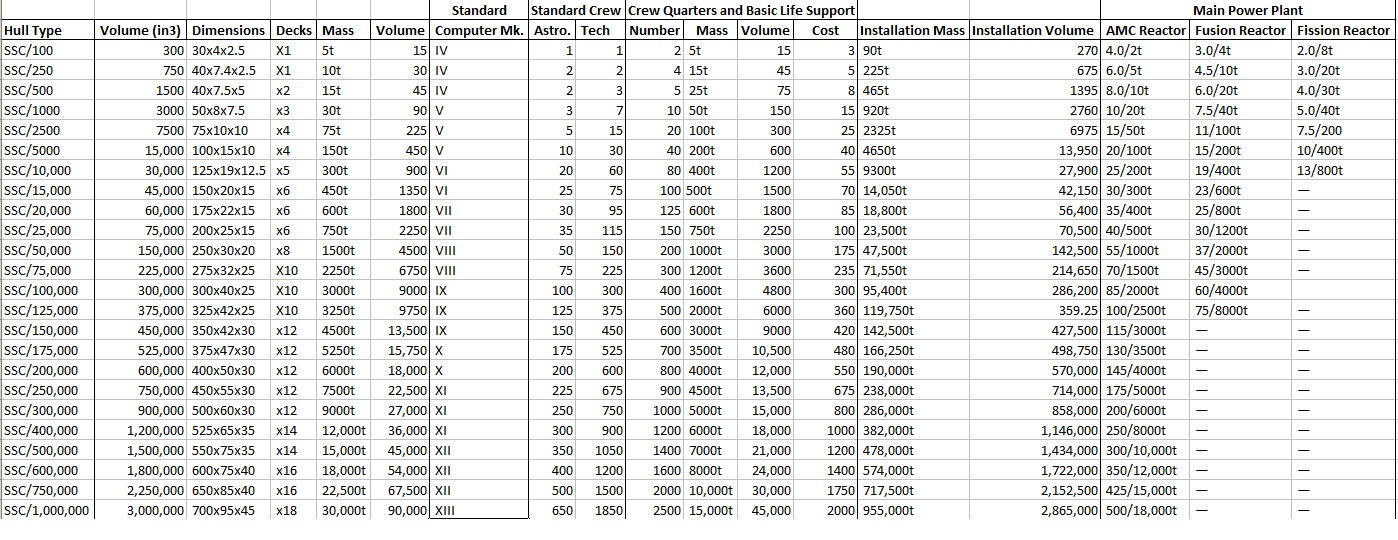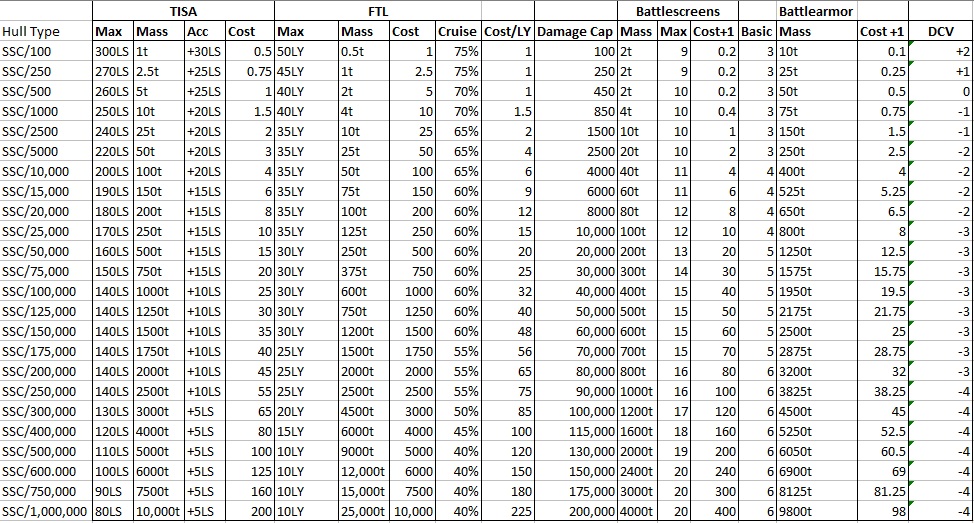Ship Creation Rules
The following are the ship creation rules from Space Opera supplemented by my own extrapolations and some changes in modern technology which make some of their suppositions utterly ridiculous. We all like ridiculous, but lets not go too far.
Basic Construction
The above table shows the standard starship hull sizes and what kind of secondary systems appear in a standard version of that hull. The cost of those systems are not included in the cost of the hull. Systems may be upgraded beyond what are listed here, which assumes Tech Level 7. Each TL upgrade automatically upgrades the Computer MK +1, and vice versa.
Computers
The computer is the central nervous system of the ship, and is therefore of critical importance. Starships utilize MultiComps as discussed on the Space Opera Computers.
Propulsion and Defense
As above, the FTL and TISA engines may be upgraded from what is standard for the hull size. Shifting the speed one level up the chart multiplies the cost of the current level by 5, calculate each increase separately, so shifting down two speeds multiplies cost by 25. Increasing speeds beyond 50 LY and 300 LS is possible as well. For each +1 LY or +5 LS, add .01x(hull mass)%.
Armaments
Maximum battery size may be increased at a 3x multiple as with other upgrades. Hardpoints listed as Fwd have a 1 hexside arc of fire pointing forward instead of a turret.
Amenities
Staterooms, High Passage: 10t/30 cubic meters displacement at cost MCR 0.25. Occupancy = 1-2 (2 max.). Quarters are very high quality and relatively comfortable, considering the austerity which is the rule aboard most spacecraft.
Staterooms, Middle Passage: 10t/30 cubic meters displacement at cost MCR 0.2. Occupancy = 2. Quarters are of good quality; stateroom can double for High Passage if let to a single occupant requiring privacy. Crew quarters are generally of Middle Passage class.
Berths, Low Passage: 10t/30 cubic meters displacement at cost MCR 0.2. Occupancy = 4. Very cramped quarters, with about 3 square meters (30 square feet) of deck per person, including space allotted to bunks, etc.
ColdSleep: 1t/3 cubic meters displacement at cost MCR 0.025. Occupancy = 1. Cryogenic chambers which can be stored in a relatively small, area may be installed for quick-freezing emergency cases and recently slain personnel, as well as for low cost interstellar travel.
Dispensary: 7.5t/22 cubic meters displacement at cost of MCR 0.25 per patient.
Sick Bay: 10t/30 cubic meters displacement at cost MCR 0.5 per patient. The Sick Bay is comparable to hospital facilities. Note, any medical facilities over 10 patients must be of Sick Bay standard.
Cargo Hold: Any undesignated mass/volume is rated as cargo hold. No additional cost is incurred for cargo capacity.
Recreation Facilities: Commercial vessels carrying over 10 passengers must provide 1t/3 cubic meters of space per passenger (regardless of class of passage) for recreation areas - lounges, mini gymnasiums, etc.). Cost = MCR 0.05 per ton/3 cubic meters.
Auxiliary Bridge: Starships over 10 000t displacement may mount an Auxiliary Bridge at 150% of cost of Computer installed. Such a computer is typically 1 or 2 Mk. below that of the Main Ship’s Computer. The displacement is 50t/150 cubic meters.


